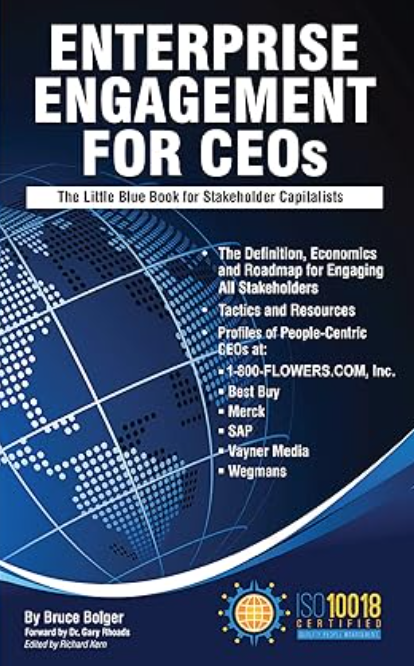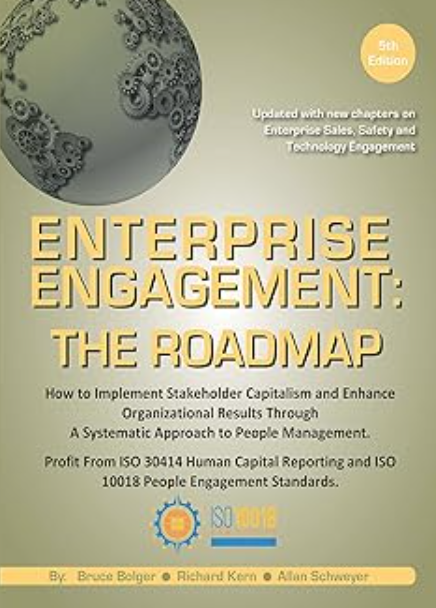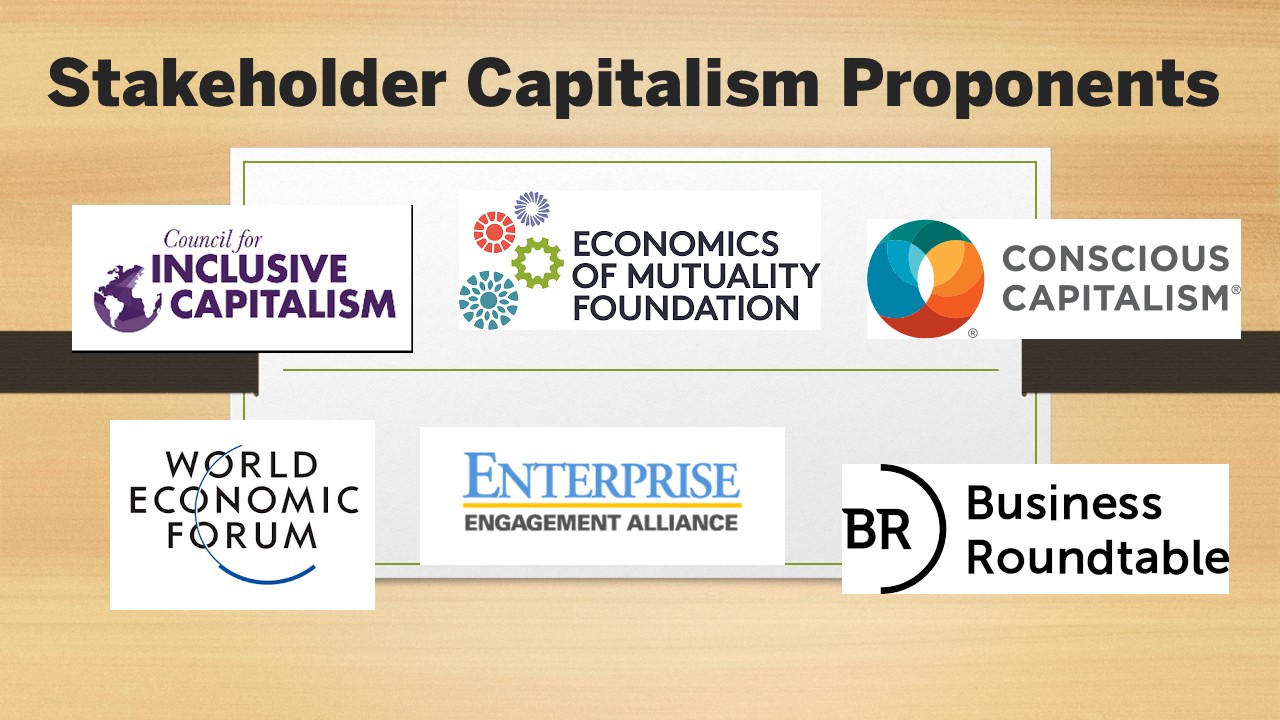Stakeholder Capitalism 2025: Progress Continues Despite Lack of Active Advocacy
The Signs of Progress
Now, the Bad News
Factors Holding Back the Concept
What Will Drive Progress
Note: Register here for the Aug. 19, 2025, 11 am ET live webinar on Stakeholder Capitalism: From Theory to Action. The show features R.
.png) Edward Freeman, Professor at the Darden Business School, author the 1984 book Strategic Management: A Stakeholder Approach and called by some the father of stakeholder capitalism, and Gary Rhoads, Professor Emeritus of Marketing and Entrepreneurship at the Marriott School of Business at Brigham Young University. Also an active entrepreneur in customer experience, engagement technology, and now social media. Rhoads served as an advisor to the Enterprise Engagement Alliance’s enterprise engagement implementation framework published in the first edition in 2009 of Enterprise Engagement: The Roadmap and all editions since. It is based largely on holistic principles and impact metrics long proven in total quality management.
Edward Freeman, Professor at the Darden Business School, author the 1984 book Strategic Management: A Stakeholder Approach and called by some the father of stakeholder capitalism, and Gary Rhoads, Professor Emeritus of Marketing and Entrepreneurship at the Marriott School of Business at Brigham Young University. Also an active entrepreneur in customer experience, engagement technology, and now social media. Rhoads served as an advisor to the Enterprise Engagement Alliance’s enterprise engagement implementation framework published in the first edition in 2009 of Enterprise Engagement: The Roadmap and all editions since. It is based largely on holistic principles and impact metrics long proven in total quality management. Click here to subscribe to the ESM weekly e-newsletter.
Aug. 19, 2025, marks the sixth anniversary of the Business Roundtable pronouncement that for the first time put a spotlight on the concept of stakeholder capitalism, a concept which dates to at least the 1940s and the work of Peter Drucker, a celebrated management consultant of the 20th century. Here is an update on the state of the movement about a month in advance of the sixth anniversary of the Business Roundtable updated charter committing members to pursuing their individual purposes by addressing the needs of all stakeholders—customers, employees, distribution and supply chain partners, communities, and the environment.
The Signs of Progress
- Organizational advocates. At least six organizations, some of them highly influential, including the Business Roundtable, World Economic Forum, JUST Capital, Conscious Capitalism, Council for Inclusive Capitalism, and Economics of Mutuality founded by Mars, not to mention the Enterprise Engagement Alliance, officially support and promote the principles of stakeholder capitalism.
- Certified companies. Nearly 10,000 companies in over 100 countries officially practice the principles of stakeholder capitalism as B-Lab certified companies. Benefits corporate statutes now exist in 37 states evenly divided between Red and Blue, although there is no way to track how many companies have registered under those statutes. Many other companies follow the practices of stakeholder capitalism without officially saying so. Click here for some examples.
- BlackRock position. In 2020, BlackRock CEO Larry Fink in his annual letter to shareholders pronounced his commitment to stakeholder capitalism, and even talked about creating an institute to support it. Said to promote research and dialog, there is no sign the institute exists, and he has backed off public pronouncements. Nonetheless, in 2022 he reaffirmed his commitment by writing that stakeholder capitalism is capitalism but otherwise has publicly moved on.
- European Union disclosure laws. Without making any reference to the concept of stakeholder capitalism, the European Union embedded its principles in its Corporate Sustainability Reporting Directive. It requires large companies to publish audited reports disclosing the risks and opportunities they create for customers, employees, distribution and supply chain partners, communities, and the environment—literally embedding stakeholder capitalism principles into EU disclosure laws.
- Academic progress. Yale University’s business school has created a program on Stakeholder Innovation and Management. The academic world’s Strategic Management Society has a Stakeholder Strategy Interest Group comprised of professors who conduct research on the subject. Classes on stakeholder capitalism and ESG (environmental, social, governance) are increasingly taught in business schools around the world. The Said School at Oxford in Great Britain has a corporate education program on the economics of mutuality concept largely aligned with stakeholder capitalism principles. A 2022 meta-analysis of academic research on the concept of stakeholder capitalism identified about 90 papers on the subject over the previous 20 years.
-
More research on and evidence of impact. There is increasing research and data backing up the hypothesis that companies with highly engaged stakeholders produce enhanced share price performance over companies that don’t.
- The Human Capital Factor ratings system developed by Irrational Capital for measuring the potential for increase future equity value of 4% per year has been validated by the quantitative analytics department of J.P. Morgan.
- An analysis of the 23-year stock performance of the United Kingdom's Best Workplaces outperforms the FTSE stock index by 400% over that period; yes, 4X performance.
- Top Companies on JUST Capital and Fortune Most Admired Company Lists Outperform the S&P 500 by 11% Over 5 Years. These companies were selected by JUST Capital based on how well they address the interests of employees, customers, communities, and the environment and by business executives in the Fortune rankings. The top 20 used in this analysis of stock returns are those US companies that appear on both lists.
- Trust 200 Index Outperforms Its Benchmarks Over 13 Years. This ongoing managed index provides more evidence that organizations do not have to sacrifice their ethics to provide superior returns for shareholders.
- Media coverage grows. Coverage of the concept in the media appears to be growing, including a recent cover story in Fast Company, Inc. and references in articles in Forbes, Inc., the Wall Street Journal, and various less-known right- and left-wing or regional publications. Fast Company is one of the few publications that have attempted to provide a comprehensive overview of the field, other than the EEA’s ESM. Maria Bartiromo recently covered the topic on a show on Fox News in an interview with Lynn de Forester Rothschild, Co-Founder of the Council for Inclusive Capitalism. The National Review and Washington Post recently published opinion pieces citing a study of a change in Nevada corporate law in 2017 that the authors believe shows the dangers of stakeholder capitalism, even though the law was created by conservatives to make the state more attractive to corporations. The state already has public benefits statutes, but those companies weren’t studied.
- Under the radar screen. The term stakeholder capitalism largely survived the assault on the far better-known term ESG, largely because it remains little known. While some right- and left-wing commentators continue to mention the topic, the term itself has not endured the same level of direct attacks as ESG.
- Capitalism is once again under attack. Concerns about income inequality could create a climate riper for reform. Americans are increasingly dissatisfied with capitalism. Only 30% of customers say they trust the companies they do business with, and just two-thirds of employees say they trust their employers (PwC survey). The 2025 Edelman Trust Barometer reports trust in big business has dropped below 50%. A 2023 study by the Center for the Study of Capitalism found that while 65% of respondents still support capitalism, only 20% feel the economy is working well or are satisfied with it.
Now, the Bad News 
Low awareness continues. Few have ever heard of the term stakeholder capitalism compared with the more broadly used term, ESG. Surveys by JUST Capital identify high approval rates from both Democrats and Republicans for the principles of addressing the needs of all stakeholders, and yet awareness remains low.
The term ESG remains far better known, explaining why the term stakeholder capitalism has not experienced the same level of public attack. Google searches for stakeholder capitalism peaked after the Business Roundtable 2019 and the World Economic Forum 2020 Davos event and today rank just above the number of searches for Democratic Socialism. Meanwhile, searches for ESG have remained generally steady, despite the pushback, and at a far greater quantity than the term stakeholder capitalism. The same phenomenon exists on Linkedin.
The term still has no official definition. Based on an analysis of usage in academic work, in 2020, the EEA developed the following definition with input from Alex Edmans, Professor of Finance at the London Business School, and Martin Whittaker, CEO of JUST Capital, which was published in Forbes in August of that year: “Enhancing returns for investors only by creating value for customers, employees, distribution and supply chain partners, communities, and the environment.” Having no agreed-upon definition makes it impossible to intelligently discuss a concept if someone harbors another definition.
ESG investment backtracks. After large inflows into ESG funds in 2024, such funds experienced a significant outflow in the first quarter of 2025, largely because of pullbacks in the US, poor performance of some of the funds and rebranding of others. It remains an enormous investment category, with such funds holding upwards of $3 trillion.
The opposition remains based on questionable definitions. The lack of a formal definition provided an opportunity for opponents to create their own definitions. A field born out of the thinking of management consultants such as Peter Drucker, W. Edwards Deming, and the Stanford Research Institute based on principles in total quality management got conflated with corporate social responsibility, statism, and even global conspiracies when the Business Roundtable, World Economic Forum and others used it during a period of heightened social unrest. For example, without providing the source of his definition, Andrew Puzder, former CEO of CKE Restaurants and author of A Tyranny for the Good of Its Victims...The Ugly Truth About Stakeholder Capitalism, argues that stakeholder capitalism undermines shareholder rights and accountability by allowing large asset managers—particularly BlackRock, Vanguard, and State Street—to impose social and political agendas on corporations without investor consent. These accusations may or may not be true, but they have nothing to do with harmonizing the interests of all stakeholders to support the organizational purpose. Nowhere can one find in academic research people advocating for diverting shareholder resources to address non-pecuniary interests unless directly related to the organization’s purpose.
Factors Holding Back the Concept
Numerous factors stand in the way of faster adoption. It took decades for total quality management to take hold in manufacturing, so it’s no surprise it has
 taken an equal amount of time in the services sector or broader economy.
taken an equal amount of time in the services sector or broader economy.The concept is still taught infrequently in business schools and corporate education, nor is it covered in business media. Despite progress, surprisingly few students receive any rigorous training on leadership or a stakeholder approach to performance through people, and there is no coverage in the general media.
There is no public outcry. People focus on what they can have impact upon. Reforming capitalism is like trying to change the weather. It’s easier to support causes like Democratic Socialism, which offer a clear-cut alternative to capitalism. People cannot fire their bosses, and they often feel constrained to buy from companies they don’t feel great about because of the convenience and value. They might hold their noses when making an investment in a company in a hot market they doubt has great people management practices. Becoming strong advocates for this field is unlikely to bring about any short-term changes in anyone’s life, so it’s easier to throw out the politicians.
People prefer to keep their jobs. How could anyone enhance their careers by becoming public advocates for stakeholder capitalism or ESG unless they work for a company that practices it or sells services to support it?
It’s an esoteric idea. The concept of enhancing returns for investors only by creating value for stakeholders and the environment to most is technical jargon, not dissimilar to the concept of total quality management. That’s why the EEA simply calls it the Golden Rule applied to business.
The prominent backers remain largely silent. Except for the Enterprise Engagement Alliance and much better funded JUST Capital, the most influential of all players are largely silent. The Business Roundtable, Conscious Capitalism, Economics of Mutuality, and Council for Inclusive Capitalism have not actively promoted their commitment to stakeholder capitalism beyond their own programs. Larry Fink of BlackRock, while not denouncing its principles, has backed off use of the terms ESG or stakeholder capitalism. The lack of active outreach could support suspicions that commitment to stakeholder capitalism principles is more show than substance.
What Will Drive Progress
The concepts of stakeholder capitalism and ESG have generally gained traction by companies and individual uncoordinated efforts that have resulted in the slow, gradual increase in awareness of the concepts. As a result, without some kind of media breakthrough, the field will continue its slow progress. Here is what could speed it up.
Cooperative action to support outreach and education. If the Business Roundtable, World Economic Forum, Conscious Capitalism, EOM, and JUST Capital organizations are serious, they could develop a cooperative effort to:
- Fund more research on the impact and implementation of stakeholder capitalism principles.
- Facilitate dissemination of practical information on implementation.
- Support the development of corporate and academic courses on the field, as the Economics of Mutuality has done with its program at the SAID school.
- Support JUST Capital’s media outreach efforts in the US and worldwide and other efforts to highlight case studies of organizations that practice these principles and actively call out opponents using disinformation to confuse the public.
- Develop a scholarship program for students interested in pursuing the subject and provide support for colleges and universities to develop research and instruction on the topic.
Investor pressures. Today, ironically, the most likely source of progress may come from investors, based on the increasingly robust research demonstrating the benefits of having highly engaged customers, employees, distribution and supply chain partners, and communities. This will become apparent once securities analysts start demanding more information from CEOs about how they harmonize the interests of stakeholders to achieve their purpose, goals, and objectives. This process could be accelerated by the Human Capital Factor of Irrational.Capital, which uses compelling analytics to demonstrate the potential for future value equity creation through people.
Public disgust with capitalism. Should the current dissatisfaction with capitalism accelerate, some economic or political disruption could prompt the equivalent of another Occupy Wall Street movement. Whether that energy gets focused on the Democratic Socialist movement versus a more subtle reform movement is a big question.
Enterprise Engagement Alliance Services
 Celebrating our 15th year, the Enterprise Engagement Alliance helps organizations enhance performance through:
Celebrating our 15th year, the Enterprise Engagement Alliance helps organizations enhance performance through:1. Information and marketing opportunities on stakeholder management and total rewards:
- ESM Weekly on stakeholder management since 2009. Click here to subscribe; click here for media kit.
- RRN Weekly on total rewards since 1996. Click here to subscribe; click here for media kit.
- EEA YouTube channel on enterprise engagement, human capital, and total rewards since 2020
 Management Academy to enhance future equity value for your organization.
Management Academy to enhance future equity value for your organization.3. Books on implementation: Enterprise Engagement for CEOs and Enterprise Engagement: The Roadmap.
4. Advisory services and research: Strategic guidance, learning and certification on stakeholder management, measurement, metrics, and corporate sustainability reporting.
5. Permission-based targeted business development to identify and build relationships with the people most likely to buy.
Contact: Bruce Bolger at TheICEE.org; 914-591-7600, ext. 230.














